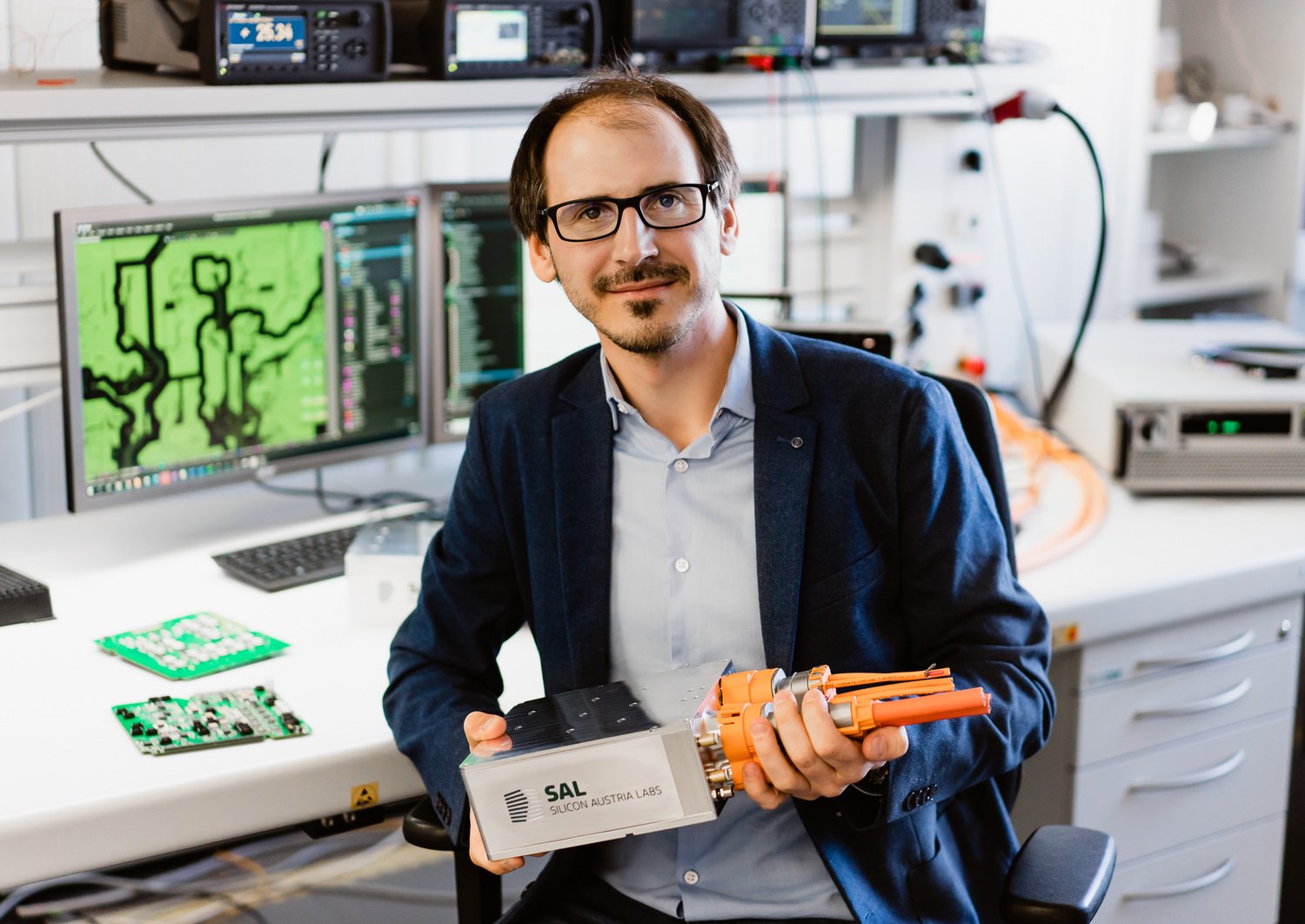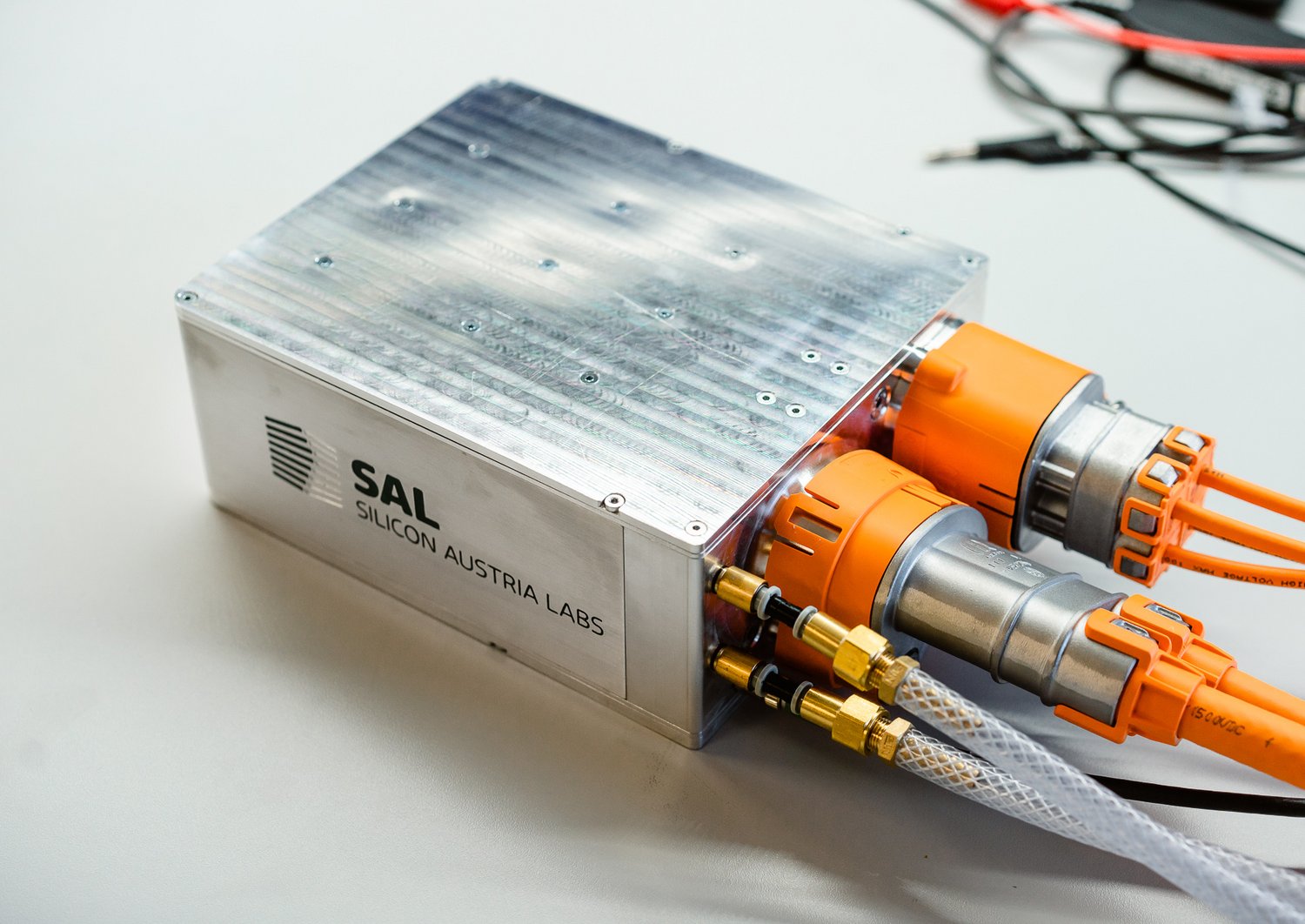More compact, lightweight and efficient – the project “Tiny Power Box” focuses on optimizing the power density of built-in chargers in electric cars, so-called onboard chargers. The results: reduced weight, fewer components and less space needed, all the while enabling quicker and more efficient charging and increasing environmental compatibility.
However, these research results are not only relevant for e-mobility: Unlike already existing onboard chargers, the Tiny Power Box is capable of storing energy in its battery and releasing it again at a power supply station on demand (so-called bidirectional charging and discharging). In combination with the Tiny Power Box, the car battery thus turns into a flexible energy storage device for renewable energy. The underlying technologies can also be used in industrial facilities.
Within the framework of this research cooperation, a new simulation method was developed as well, which can be used to predict how different components of a system will interact with each other before an actual physical prototype is built. This way, the development period can be minimized, and life expectancy maximized.
Flagship example of cooperative research
“The Tiny Power Box project is a flagship example of how we conduct cooperative research at SAL, and the first project phase has exceeded the expectations of all parties involved. Power density is essential for all partners involved and everyone possesses a lot of know-how in their area of expertise – but only together we were able to develop the Tiny Power Box and the new simulation method. In turn, each company is able to use the results for their own applications,” explains Rudolf Krall, Head of Research Division Power Electronics at SAL in Graz.
“Combining SAL’s expertise and the specialized knowledge of our research partners – starting with know-how on individual components to the whole system – is especially important in being able to properly optimize power electronic systems. This is where the strength of SAL’s cooperative research model lies. Feedback from the tech community regarding the Tiny Power Box prototype was exceedingly positive, and leading European vehicle manufacturers and component suppliers have shown great interest. Owing to the overwhelming success, we will start a follow-up project with additional partners in fall. This way, we hope to be able to answer further research questions concerning power electronic components,” announces SAL project leader Christian Mentin.
“Through the joint research, we show how our new silicon carbide power semiconductors are used in a highly efficient way together with other energy conversion components. Bidirectional charging in particular is a big step towards green energy, as the electric car can be charged with solar energy and then used for power stabilization and energy storage at home. With the application demonstrator, we have a compact and efficient energy solution that we can further test and optimize in follow-up projects. It is an important contribution to the energy transformation and decarbonization,” knows Ernst Katzmaier, Senior Director Technical Marketing High Voltage Conversion at Infineon Technologies Austria AG.
“As part of the Tiny Power Box project, we have gained important impulses about the industrial feasibility of innovative charging concepts for intralogistics for future applications, and we had the opportunity to test new power converter concepts for these applications. The holistic simulation method that was developed as part of the project allows us to come to decisions about conceptual choices faster than before,” appreciates Günter Ritzberger, researcher at Fronius International GmbH.
“Power electronics is an important topic for AT&S in all business areas from industry to automotive. In this project we managed to improve the cooling system of components using semiconductors on printed circuit boards and increase the efficiency of the system. We are proud of how far we have come and we look forward to continuing our cooperation in fall,” states Hannes Voraberger, Director of Research and Development at AT&S AG.
“What’s special about this project is the holistic view of all TDK components in the integral system. We were able to identify interactions and design and application requirements at an early stage and thus ensure the ideal use of our components. This way, it was possible to build the Tiny Power Box as small and efficient as possible,” explains Markus Puff, Head of Corporate Research & Development of the Piezo & Protection DevicesBusiness Group at TDK Electronics GmbH & Co OG.
“Our project goal was to develop a scalable method to integrate components and subsystems of power electronics virtually and aided by simulations. We were able to successfully test and optimize simulations of cooling of the integral system as well as a system simulation using a multitude of components. In the future, these simulations shall be used in calculation tools at AVL List GmbH,” announces Reinhard Tatschl, Research and Technology Manager at AVL List GmbH.
About Silicon Austria Labs (SAL)
Silicon Austria Labs GmbH (SAL) is Austria’s top research center for electronic-based systems, which are the technological backbone of digitization. At the sites in Graz, Villach and Linz, research is conducted on key technologies in the areas of Microsystems, Sensor Systems, Power Electronics, Intelligent Wireless Systems and Embedded Systems. This way, SAL is connecting important actors from industry and academia, centralizes important expertise and know-how, and conducts cooperative application-oriented research along the value chain. The goal is to accelerate the value creation process from idea to innovation – with excellent research and economic impact. Shareholders are the Republic of Austria (50,1%), the federal states of Styria and Carinthia (10% respectively), the federal state of Upper Austria (4,95%) and the Austrian Association for the Electric and Electronics Industry (FEEI, 24,95%).
Contact:
Silicon Austria Labs GmbH
Isabella Preuer, BA BA MA
+43 664 832 97 73
press@silicon-austria.com






